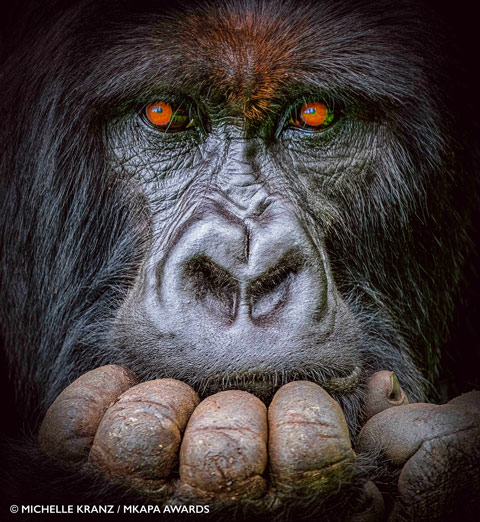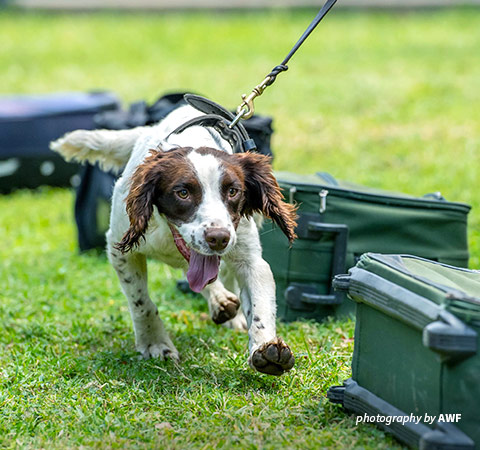AWF in 2022: African-led efforts transform conservation

African Wildlife Foundation continues to support wildlife scouts and rangers as custodians of Africa's wildlife and ecosystems
With back-to-back United Nations conferences on climate change and biodiversity over the last few months, the world is checking out of 2022 with a stark reminder of the work that lies ahead. We look back at how African Wildlife Foundation’s vision for conservation and our action over the last year have helped catalyze an African-led agenda for change and set us up for success following the adoption of the Kunming-Montreal Global Biodiversity Framework.
Elevating African voices in the conservation agenda
In July 2022, we co-convened the first-ever IUCN Africa Protected Areas Congress (APAC) in Kigali, Rwanda, bringing together African leaders, organizations, and community groups. Never before has the continent taken charge of critically assessing the issues facing Africa’s protected and conserved areas in this way — over 8,000 people attended in-person and virtual plenary sessions and discussions about conservation governance and finance, the role of indigenous people and local communities, and the link between biodiversity and development. The six-day congress culminated in the adoption of the Kigali Call to Action, a landmark pledge charting the way forward and representing the interests of all Africans, especially youth and indigenous communities whose input and perspective has long been neglected from such discussions.
Similarly, AWF ensured that young Africans and community groups have a seat at the table during global environmental policy negotiations this year. We went a step further to train our Charles R. Wall Young African Policy Fellows before attending these discussions, starting from the African Ministerial Conference on the Environment in September 2022, and later the U.N. Climate Change Conference (UNFCCC COP27), the Convention on International Trade in Endangered Species of Wild Fauna and Flora COP19, and the Convention on Biological Diversity COP15.
Supporting Africans as custodians of biodiversity
In addition to training young professionals from across the continent to represent their interests as environmental negotiators through the Charles R. Wall Young African Policy Fellowship, we continue to support wildlife scouts and rangers working to secure wildlife populations. In priority landscapes in Kenya, Tanzania, Uganda, the Democratic Republic of Congo, Cameroon, and Zimbabwe, we provide teams with additional training and equipment needed for ecological monitoring in critical wildlife zones. In July, Iyondji Community Bonobo Reserve’s eco-guards — a team AWF has supported for many years in DRC — received a IUCN International Ranger Award for their important work protecting critically endangered bonobos.
Though their work might be different than rangers’, nature filmmakers and photographers possess the same appreciation for Africa’s wildlife species and natural ecosystems. As such, AWF extends training and mentorship opportunities to African filmmakers through the African Conservation Voices program. In partnership with Jackson Wild, these filmmakers produced six short films that challenge traditional, Western narratives about conservation by putting local people at the center of conservation stories. Their films are set in Kenya’s Maasai Mara landscape and the Volcanoes National Park in Rwanda, and were screened at the Jackson Wild Summit in Austria in September.

The Grand Prize winner was chosen from all the categories of the Mkapa Photography Awards 2022
The 2021 Benjamin Mkapa African Wildlife Photography Awards exhibition travelled to Arusha, Tanzania and Harare, Zimbabwe this year. Meanwhile, the second edition of the Mkapa awards this year garnered more entries than the inaugural competition. The winning close-up of a mountain gorilla invites much-needed attention to the endangered species, while the competition’s African Conservation Heroes and Coexistence and Conflict categories ensure that people are still in the picture.
Integrating sustainable development and conservation strategies
In recognition of AWF’s contribution to mountain gorilla conservation in Rwanda, AWF CEO Kaddu Sebunya had the honor of christening a baby female gorilla at Kwita Izina in September. Named Indatezuka, which means ‘resilient,’ the young gorilla represents the collective action required to deliver long-term, inclusive conservation success. It signals our role in bringing mountain gorilla back from the brink decades ago, and our vision for sustainable development.
As part of our efforts in partnership with the Government of Rwanda to lead in building conservation models that benefit people, AWF held stakeholder engagement campaigns based on the principles of Free, Prior and Informed Consent before launching the pilot phase of an ambitious program to restore habitat for mountain gorillas and build a green economy around Volcanoes National Park. The trial run of the action plan for communities living around the protected area is central to this innovative conservation model that conserves an essential ecosystem and boosts sustainable development.
Sustainable, African-owned solutions will transform conservation for the better of the continent’s people and its essential ecosystems. During the COVID-19 pandemic, AWF spearheaded a consultative process with protected area directors across Africa to address a quickly escalatingconservation funding crisis. This year, at APAC, AWF board member H.E. Hailemariam Desalegn, Former Prime Minister of Ethiopia, announced the launch of A Pan-African Conservation Trust (APACT). As Chair of the Steering Committee, he stressed the sustainable financing mechanism as an important means of getting conservation funding to people on the ground who need it most.
AWF has long recognized that wildlife economies are fundamental to linking conservation and development. We supported the development of the ‘State of the Biodiversity Economy in Zimbabwe’ report since 2021. In April 2022, we held a workshop with various national agencies and stakeholders to review the findings of this first-ever assessment of the country’s biodiversity assets, a landmark in the long-term development of wildlife economies in Zimbabwe.
Responding to urgent conservation challenges
AWF has been visionary in embracing wildlife economies at a smaller scale too. This year, we continued to work with communities in wildlife-rich landscapes across Africa to provide alternative sources of income derived from conserving species and habitats. The introduction of sustainable farming practices in DRC and Cameroon has led to better yields while saving forests from conversion into more farmland.
In the transboundary Tsavo-Mkomazi landscape, where we have worked with farmers to mitigate human-wildlife conflict by growing chili peppers to deter elephants from wandering into their crops, we helped sink boreholes and clear water pans during the drought. Diversifying incomes also cushions farmers against climate shocks like the current extended dry period, which has ravaged communities and ecosystems. In Tanzania, AWF has installed beehive fences that keep elephants away, while also creating a new revenue source for farmers.

AWF trains wildlife detection dogs and their handlers to be deployed at trafficking and poaching hotspots
In other wildlife-rich landscapes where illegal wildlife trafficking and poaching threaten wildlife populations, we have deployed tracker and sniffer dog unitstrained through our Canines for Conservation program. In November, the Uganda Wildlife Authority (UWA) received two tracker dogs to be stationed at a strategic trafficking hotspot near Murchison Falls National Park. AWF also helped build the facility and train six UWA rangers as dog handlers, bringing the total number of tracker dog units in East Africa to five. In tandem with sniffer dogs at major airports and transit points in Botswana, Cameroon, Kenya, Mozambique, Tanzania and Uganda, our tracker dog units help authorities detect illegal wildlife products and criminals through intelligence-led operations.
AWF's judicial and prosecutorial support programs strengthen each stage of the prosecutorial process — from how wildlife evidence is collected and stored to how digital evidence can be used to prosecute wildlife criminals and investigate cybercrime. AWF’s on-the-job training and mentorship programs also help prosecutors sharpen their knowledge of wildlife crime and ensure their cases end in deterrent convictions.
Advocacy in the U.S. Congress helps Africa’s wildlife
At the same time, we are engaging with policymakers in the U.S. Congress to ensure that wildlife legislation bolsters our conservation efforts on the ground. We are closing off 2022 with various legislative milestones for African wildlife species. In addition to the recently signed Big Cat Public Safety Act, which will limit the trade of Africa’s big cats as exotic pets, AWF supports the addition of the END Wildlife Trafficking Reauthorization and Improvements Act to security legislation, boosting interagency cooperation.
AWF CEO Kaddu Sebunya's attendance at the U.S.-Africa Leaders Summit this month signals the strong relationships and partnerships that we have built over the last 60 years and shows the potential of putting people at the center of conservation in Africa.
> Listen to AWF and Foreign Policy's podcast series to learn more about African-led conservation